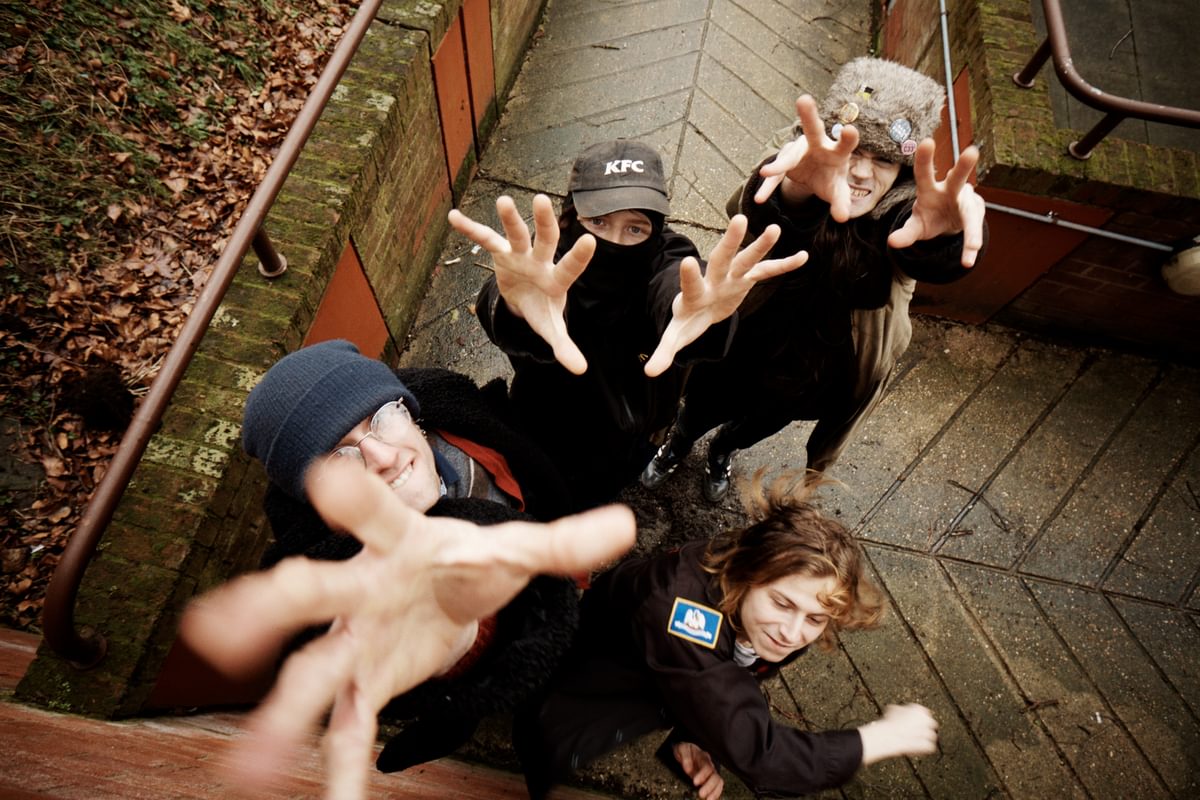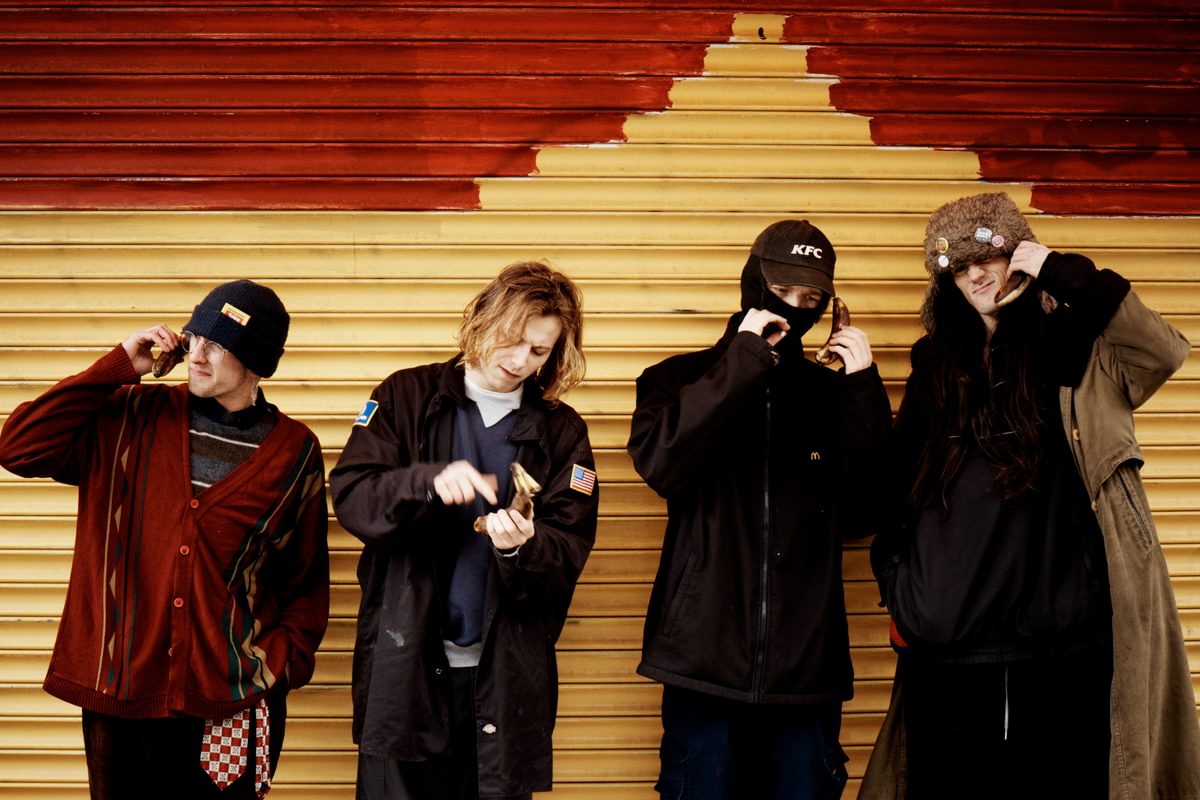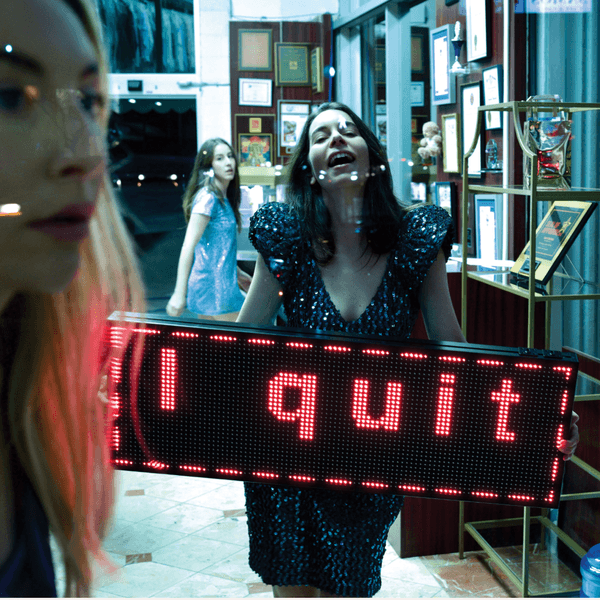
UNIVERSITY are from the school of organised chaos
With their glorious, Jackson Pollock-esque record hot off the presses, the members of Crewe quartet UNIVERSITY sit down with Isabella Ambrosio to discuss what happens when a scrappy little band nobody cares about becomes one that shows up the rest of its class again and again.
Quick, all-encompassing, and unrelenting, UNIVERSITY have a proud flair for the dramatic. Their music booms with the energy of flailing limbs and youthful experimentation, blending the unexpected with an unassuming post-post-punk-revival spirit.
The Crewe-born four-piece toy with people’s expectations not just for the sake of novelty, but because it’s how their minds work. Each in their early twenties, they’re at an age where adolescent safety nets and railings have fallen away, leaving them to bounce along the bumpers of adulthood thrashing and punching through different sounds and taking no shit. UNIVERSITY’s debut album, McCartney, It’ll Be OK, is the fruit of that journey so far, as taken by Zak Bowker, Ewan Barton, Joel Smith, and their gamer ‘mascot’ Eddie Leigh, whose on-stage role in the live shows is to sit on a sofa playing Xbox.
Ever the enigma, Leigh isn’t with us today, happy to let the other three to do the talking. Calling from Barton’s dad’s house, they’re in close quarters, all three crammed onto a tiny sofa – the same sofa that Smith and Bowker were “basically squatting” on for some time in the early days of the band. With few employment opportunities around at the time, the days were mostly spent together. “There were no jobs anywhere for us so we just used to practice every single day, like 12pm to 8pm seven days a week,” explains Bowker. “For, like, a year and a half,” says Smith. “Until we started getting noise complaints,” Barton jokes. “Which took a bit, but we just started writing louder music,” laughs Smith.
Chainsmoking throughout our conversation, as if the cigarettes themselves contained oxygen, and passing a communal lighter between them, UNIVERSITY’s jokes and banter are reminiscent of tradies who’ve been drinking together in the same pub for decades. “We probably got aged a bit by being on the road,” Smith confides. Some days those three years since their first release might feel more like 30.
Growing up in Crewe, a town more famous for its railway than its music scene – which, according to Smith, barely existed – UNIVERSITY weren’t exactly surrounded by musicians to look up to. For the same reasons, no one in Crewe even bats an eyelid at the band when they sell out a show in London, as they do with regularity. Most young adults who begin to see success start foaming at the mouth for more, whereas UNIVERSITY approach their music and success with a sense of nonchalance and humility. “We got snatched up so quick that we were getting shown to everybody like some freak exhibit or something, you know, ‘Look at these weirdos,’” says Smith. “I think us saying this stuff makes us sound like freaks and shit ‘cause we’re from a terrible town up north, and there’s like no other bands here. There’s no one to relate to about any of this shit.”
‘Freaks’ seem like too degrading a word to use for UNIVERSITY. I prefer imaginative, explorative, fearless, conceptual, borderline impressionistic. Everything about the band is curious – their sound, their structure, their outlook, even their formation. Smith rattles on, “I feel like everyone’s got the same thing [going on]. Like, you just meet in college and you start playing music.” Smith and Barton did in fact meet in secondary school, but “I’d be damned if you caught me playing with him,” says Smith, jutting his thumb at his friend to the right. “We were into totally different stuff. And he had, like, stupid guitars with spikes on, and I just thought that was totally out of order.” Bowker just smiles.

None of UNIVERSITY actually went to uni, instead hanging back, completely solidified in their decision to keep working on their music. They didn’t have the money to go, even if they’d wanted to, and “we already had the band together, basically,” says Barton. As self-proclaimed “very cynical people” (Smith), the band are “probably more aligned” on what they dislike collectively rather than what they individually enjoy. That comes through in the sardonic sense of humour that translates into everything they do – from Eddie the enigma to their lack of a media presence. “We’re very disenfranchised,” jokes Smith.
“You can get a lot of the esoteric nature of our minds through the song titles,” he adds. “A lot of people try to read a lot of meaning into our stuff and there isn’t [any]. It’s the emotions we’re laying on the table that’s the important part, not what we’re actually saying.” Across the 40-minute runtime of McCartney, It’ll Be OK, those emotions zigzag between apathy and overwhelm, hitting notes of joyfulness, impatience, frustration, and resentment. They’re a band that finds their authenticity in the abstract and obscure.
Smith takes a drag from his latest cigarette. “I don’t want to throw shade, but like all these London bands, bro, they always end up sounding very formulaic. Everyone’s going to [the same gigs], no one’s buying t-shirts –” “They’re all churned [out] by the same machine,” Bowker chips in, a cloud of smoke leaving his mouth. And they’re not entirely wrong.
Coming from a small town, on the other hand, helps to foster something different. Something more organic and less obviously influenced by what’s immediately at hand. “For us, everyone’s kind of on an even playing field,” says Smith, adding, “We end up gravitating towards a lot of American math rock stuff rather than the stuff around us.”
Work on McCartney, It’ll Be OK began before UNIVERSITY had even recorded their first EP, 2023’s Track Title, which is when Smith remembers writing songs like “Hustler’s Metamorphosis” and “Massive Twenty One Pilots Tattoo”. Bowker and Barton disagree on some of the details, getting into a somewhat heated back and forth. It’s not at all malicious as arguments go, just a passionate recollection of the band’s beginnings. The three turn to each other, debating among themselves, trying to map out a timeline that may never become clear. For some bands, that would drive them over the edge. For UNIVERSITY? It’s just their natural chaotic nature. But, they conclude, they “don’t think the songs are as out of date [as the ones on the EP].”
What they are sure of, though, is that the album was completed towards the end of last summer. “I remember we finished recording it and we did a gig that was fucking horrific,” Smith says candidly. “We probably spent less than two weeks actually making the thing. We work very quick in the studio. We don’t like spending too much time [on things], we don’t like second guessing ourselves.” He breaks off, turning to Bowker and pointing at the box of smokes sitting on the table in front of them, muttering, “Can I have one?”
Not every great album requires spending months or years on, perfecting each little detail. Rather, it requires a dedication to the practice of music making itself, and that’s perhaps what shines the brightest about UNIVERSITY – that and their humility, despite all that they’ve achieved against the odds. “The studio release is the work of art,” Barton stresses, and he’s quite right: McCartney, It’ll Be OK is a glorious, Jackson Pollock-esque record that puts what it means to be creative and unique in a whole new light. Pull up a chair, school is in session.
Get the Best Fit take on the week in music direct to your inbox every Friday

Tropical F*ck Storm
Fairyland Codex

Loyle Carner
hopefully !

YUNGBLUD
Idols





